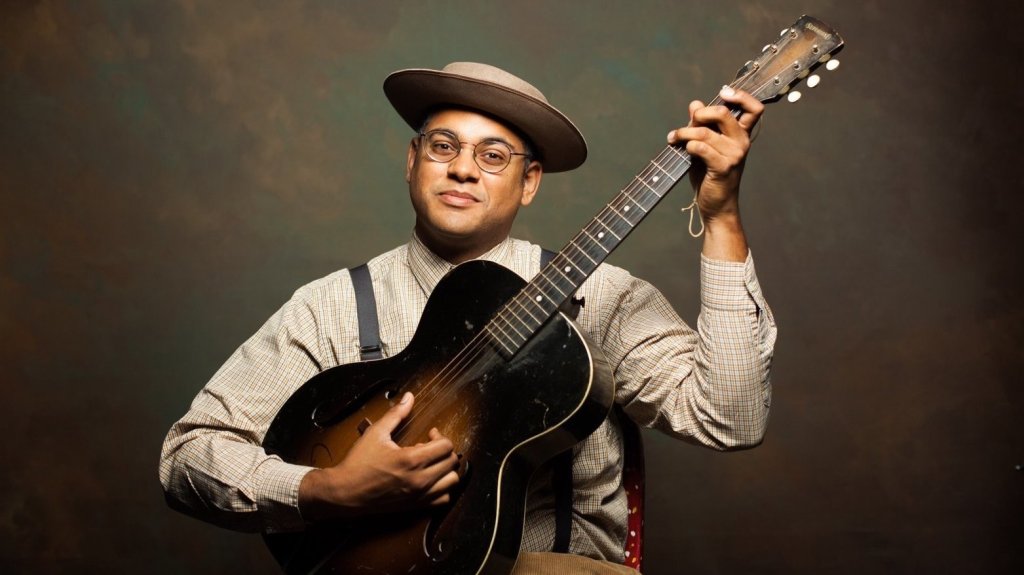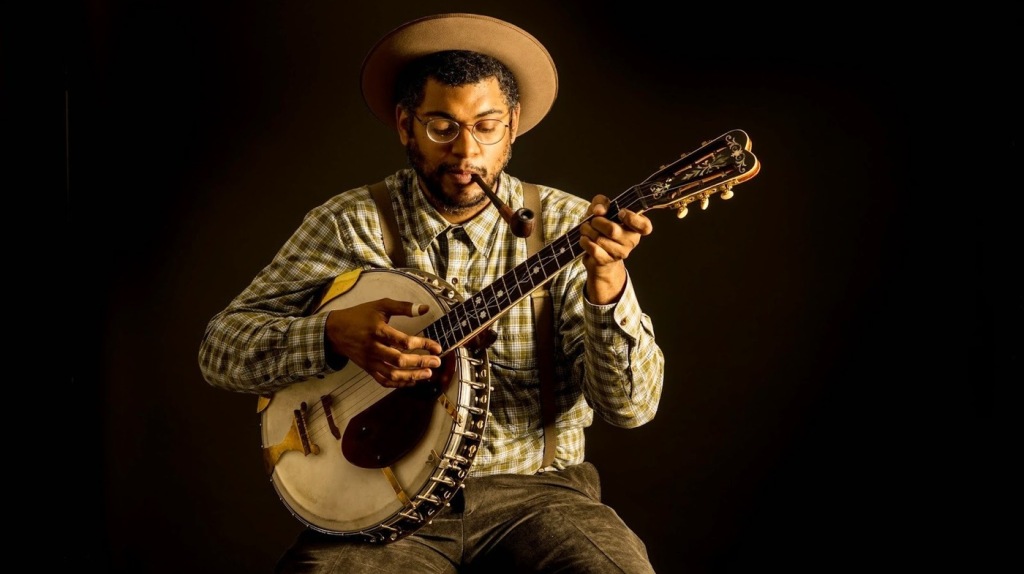GRAMMY Award Winner and two-time EMMY nominee, Dom Flemons will be gracing us with his stellar musicianship, knowledge of history and music, and personable stage presence to the WITF Public Media Center in Harrisburg, PA on Wednesday, April 26th at 7:30 p.m. More information and official SFMS Covid Safety Policies can be found on the Susquehanna Folk Music Society website. Tickets for the concert are $24 General Admission, $10 Nonmember Students, and FREE for Susquehanna Folk Members! This includes new members. Tickets for this concert can be purchased on the Susquehanna Folk Music Society website.

With a repertoire that spans over a hundred years of early American popular music, Dom Flemons calls himself “The American Songster.” ® SFMS audiences have loved his stellar musicianship on multiple instruments, his personable stage presence, and the depth of knowledge he shares about the Black American experience through music. He is an expert player on the banjo, guitar, harmonica, jug, percussion, quills, fife and rhythm bones. He is also a songwriter, producer, actor, slam poet, music scholar, historian and record collector. Flemons’ career includes numerous honors and unique experiences in addition to his tours and recordings, and no brief description can do it justice. SFMS Staff Writer Mary-Grace Autumn Lee had the chance to chat with Dom Flemons about his music, life on the road, and the importance of keeping folk music and history alive and relevant.
How did you first become interested in playing and performing music?
When I first began playing the acoustic guitar when I was around 16 years old, I became interested in playing music in the coffee houses and on the streets like my musical heroes from the 1960s folk revival. I started out as a solo performer busking and doing local gigs when I was in college at Northern Arizona University. Then in 2005 I attended the Black Banjo Gathering in Boone, NC and the rest is history.
You are referred to as the “American songster.” Can you explain this title for those who are not familiar with that terminology?
I first heard the term Songster in the book called Songsters and Saints written by blues scholar Paul Oliver. A Songster was a musician who sang and played a variety of material. In the years before recorded technology, music for the folk artist was less driven by genres and more by community necessity. I have found in the 21st century, the term songster holds a new relevance in the world now that music is less driven by strict genre classifications and can evolve in completely different ways. As I tend to focus on American roots music in my repertoire, I felt that “The American Songster” was a great way to describe the music I present on stage and on my records. I first began using the term when I titled my 2009 solo album, American Songster. I have now traveled the world carrying this moniker with me and I feel it has served me well in musical adventures.
Not only are you a gifted multi-instrumentalist, but you are also a producer, actor, slam poet, music scholar, historian, and record collector. How do all of these interests tie into your songwriting and arrangement of music?
When writing and arranging music, I am always working to create music that can be heard and interpreted on multiple levels. Having dipped into all of these artistic and academic roles over the years, they all continue my love for music. It allows me to look at my music from multiple perspectives highlighting lesser known stories that can be interpreted by my listeners in multiple ways. When I record an album I always write liner notes so that I can convey additional information for folks that are interested. When I first started playing music, I learned a lot of my first information from reading the backs of records and I try to consider that when I put together my albums. It also influences the way that I craft my storytelling. Some songs have dense histories and being able to condense these larger stories into a song can be very satisfying in both an artistic and academic way.
Who were your musical inspirations when you were growing up? And how did their music influence you?
I have had a lot of musical influences over the years. The 60s folk revival was a big part of it. I developed a passion for artists like Bob Dylan, Mississippi John hurt, Leadbelly, Phil Ochs, Ramblin Jack Elliott and a whole lot more. There were also a lot of rock ‘n’ roll artists that moved me. People like Chuck Berry, Fats Domino and Carl Perkins are some favorites. I’ve always frequented a lot of folk festivals and old-time music conventions and a lot of the music I heard in those big jams influenced me. Once I moved to North Carolina from Arizona back in 2005 I began to meet a lot of blues musicians through my work with Music Maker Relief Foundation. Musicians like John Dee Holeman, Boo Hanks, and Algia Mae Hinton were wonderful mentors to me. Old-time musicians like Mike Seeger and John Cohen we’re also great friends and mentors. When I think back on all these wonderful musicians I got to meet it inspires me to try to match their artistry with my own. This is much easier said than done. It takes a lot of studying and a lot of listening to make great music and I am always trying to create the best music I can to appeal to the widest audience possible.

For years, you toured with the Carolina Chocolate Drops, and they are a pivotal part of your own personal legacy. You now are pursuing a path as a solo artist. What was your experience as an artist going from arranging music and touring with a band to arranging music and touring as a solo artist?
It’s been around eight years since I left Carolina Chocolate Drops in 2014 so I’ve been following my own solo path for quite a while. I’ve enjoyed the freedom to present my vision as I feel it deep in my heart and soul. I started out as a solo artist so working with the band was the biggest adjustment I needed to make at first. When you are a soloist, you have a lot of freedom to do what you please on stage. When you’re playing in a band you have to arrange everything to some degree before you can get going and I think that’s probably the biggest difference. While I cannot be more than one person on stage at a time, I have learned several techniques from traditional music that have allowed me to fill the space of an entire band on stage. I’ve also led my own touring groups over the years following the chocolate drops and there is a beauty to being able to have the support of additional musicians on stage. Still, I started out as a soloist and I find myself most comfortable in that setting.
Susquehanna Folk is honored to be a part of your spring tour. What are some of your favorite things about touring and performing music for people?
One of my favorite pastimes on tour is getting a chance to go to the local record stores in the town where I am playing. I also enjoy going to museums and local road stops along the way. I found that generally these activities are much less expensive than other things you can do on the road and I also find I walk away much more informed after visiting them. Especially when it came to my research materials related to the black West. Over many years, I enjoyed taking the time to visit many western museums that have amazing collections and stunning artwork that are specific to the region. When on tour I also try to visit different landmarks, historical markers, national parks and memorials, so I can get to know more about the community surrounding the venues. As for performing for people, that was something that appealed to me from day one. It’s wonderful to be able to present traditional and original material that I’ve crafted for an audience who is engaged and ready for a great time. This is more important now than ever, especially since people are emerging from the worldwide pandemic realizing that they have been starved for musical and intellectual entertainment. Music and history are two of the things that started me on the path to where I am now and I’m so glad that I’ve been able to share it with audiences around the world.
Dom Flemons will be performing at the WITF Public Media Center in Harrisburg, PA on Wednesday, April 26th at 7:30 pm. More information and official SFMS Covid Safety Policies can be found on the Susquehanna Folk Music Society website. Tickets for the concert are $24 General Admission, $10 nonmember students, and FREE for Susquehanna Folk Members! This includes new members. Tickets for this concert can be purchase on the Susquehanna Folk Music Society website.
______________________________________________________
Mary-Grace Autumn Lee is a Harrisburg area musician. You can find her on instagram @thatdulcimergirl, her youtube channel, and her official site. Mary-Grace also plays with the Celtic/Americana band Seasons.
